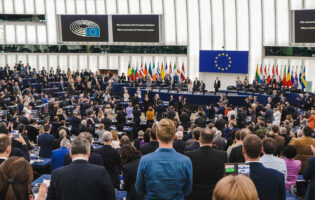The End of Austerity?

Alexander Privitera
AGI Non-Resident Senior Fellow
Alexander Privitera a Geoeconomics Non-Resident Senior Fellow at AGI. He is a columnist at BRINK news and professor at Marconi University. He was previously Senior Policy Advisor at the European Banking Federation and was the head of European affairs at Commerzbank AG. He focuses primarily on Germany’s European policies and their impact on relations between the United States and Europe. Previously, Mr. Privitera was the Washington-based correspondent for the leading German news channel, N24. As a journalist, over the past two decades he has been posted to Berlin, Bonn, Brussels, and Rome. Mr. Privitera was born in Rome, Italy, and holds a degree in Political Science (International Relations and Economics) from La Sapienza University in Rome.
Gloom and doom has once again descended upon Europe. Unease across the continent has returned as Spain’s banking system risks dragging the whole country into the abyss, and France gets ready to vote “no” to German-driven austerity in the second round of its Presidential elections.
The future of the euro, at least according to the German Bundesbank, now hinges on France’s willingness, or lack thereof, to stay the course that President Nicolas Sarkozy and Chancellor Merkel agreed upon. Whether it will is very much at the center of the European debate. Last week, the media headlines publicized the very public spat between Merkel and Hollande, pitting “German austerity” against “French growth.” Undoubtedly, Keynesians on both sides of the Atlantic feel vindicated. Spearheaded by former Secretary of the Treasury Larry Summers and Nobel prize winning economist Paul Krugman, they remind us all that austerity is self defeating. Fiscal stimulus appears finally to be back in vogue.
German government officials are trying to put a brave face on what now seems an inevitable shift in politics in France, and possibly across the continent. Even if France’s Socialist candidate Francois Hollande were to win, it is believed that once the political campaign is over (soon after the legislative elections in June), he will act reasonably. But what “reasonably” means is not clear. For Germany, the only course is strict adherence to the fiscal compact. Undermining the fiscal treaty would jeopardize the carefully orchestrated rescue of the euro zone. Surely, they argue in Berlin, Hollande would not risk endangering decades of European integration.
However, austerity already seems like yesterday’s news, with the debate now shifting to the need for growth. German media now describe Merkel as increasingly isolated in Europe. The Chancellor, seeking to keep ahead of the game, is rushing to redefine “growth” before French voters do it for her. As a matter of fact, Merkel is far from being isolated, as she has found two crucially important allies in the President of the European Central Bank (ECB) Mario Draghi and Italian Prime Minister Mario Monti. Both gentleman are worried that a new debate on the fiscal compact could lead to severe market disruptions, which might jeopardize Italy’s reforms, possibly even bringing about Monti’s downfall in Rome. Together, Merkel, Monti and Draghi are arguing that without fiscal restraint and structural reforms, any real, sustainable growth will remain elusive. A measure of short term pain, they argue, will make weaker European countries more competitive. If Europe stays the course, it is investing in a much brighter future for larger swaths of the European population, and in particular for young people, who are at the core of today’s rising unemployment across the continent.
Monti, Merkel and Draghi are willing to offer Hollande a symbolic victory if he agrees to their terms. He may very well accept the deal. Hollande is not a Eurosceptic. He has a good working relationship with the Social Democrats in Germany, who are as committed to fiscal austerity as the Christian Democrat Chancellor. He is well aware of what happened to his former boss, President Francois Mitterand, when he enacted his socialist agenda in the early 1980s and was brought back to reason by a virulent reaction from the financial markets. Furthermore, Hollande has enlisted some prominent pro-European economists to advise him on the best course of action.
It would be a shrewd move on Hollande’s part to engage with Merkel, Draghi and Monti, and to take their offer seriously. The socialist Presidential candidate is a strong advocate for the introduction of Eurobonds – as is Italian Prime Minister Mario Monti. The introduction of Eurobonds could well be the price that Merkel has to pay to have Hollande on her side. Paris may well toss the ball squarely back into Berlin’s court.









